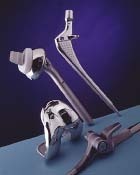Artificial Hip and Knee Implants' Success and Longevity Under Fire
by
Joan Trombetti, Writer | October 20, 2008

Artificial hip and knee
Two recent studies show that a number of patients who receive artificial hips and knees will need to have them replaced, and there is no way to tell what types of activities might cause the need for replacement.
Widely popular procedures, knee and hip replacement surgery is performed on thousands of individuals every year, predicted to reach 3.4 million per year by 2030.
When successful, these surgeries can relieve patients of debilitating pain and allow them to walk normally again. But joint implants have a finite lifespan, and will eventually need to be replaced. Often implants -- for example -- Stryker Hip Implants and Zimmer Durom Cup Hip Implants -- are recalled, resulting in the need for early revision. But even proven implants won't last forever.
The first study, conducted by British researchers, found that one in 75 people who undergo hip or knee replacement surgery must undergo surgical revision within three years. Even with quality care, replacement surgery is not always avoidable.
The study found that the number of revisions gets higher depending on several factors. For example, hip resurfacing required revision at a higher rate than the traditional operation. According to the report, 2.6 percent of resurfacing patients got a redo in three years compared with just under one percent who got a cemented new hip.
Patients with a partial knee replacement needed more revisions than those who undergo a more traditional procedure. The rate of a revision with that procedure was about 2.8 percent.
A second study, conducted by researchers at Massachusetts Lahey Clinic found that there is no evidence available right now to enable doctors to advise patients on what activities might be safest for their new joint. While most doctors will tell their patients that low-impact activities, such as walking and jogging are fine, there is no agreement on more strenuous sports. There is also no evidence that hip resurfacing -- typically offered to younger patients -- will enable a return to more strenuous activities than traditional hip replacement.
